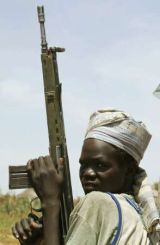Almost 40 ceasefire violations in Darfur from October: official
ABUJA, Dec 13 (AFP) — An African Union ceasefire commission said about 40 ceasefire violations by parties to a conflict in Sudan’s Darfur crisis were recorded between October and early December, an AU spokesman said.

|
|
A member of Sudan Liberation Army (SLA) walks with his rifle at Ashma village 30 km (19 miles) from Nyala, south Darfur, October 6, 2004. (Reuters) |
“The violations went from 13 (registered cases) in September to 52 (by) early December,” AU spokesman Assane Ba said, quoting an official of the Commission, Lieutenant Colonel Eric Tele.
Tele was addressing a plenary session of AU-brokered peace talks in Nigeria on conflict in Sudan’s western Darfur region, where the United Nations says local people and refugees face the world’s worst current humanitarian crisis.
A rebellion erupted in February last year and has been battled by government troops and a proxy Arab militia accused by the United States and other outside forces of atrocities against the local people of black African origin.
The warring sides from western Sudan met here Monday at the International Conference Centre to “review developments on the ground” in the troubled region.
The meeting, the first bringing together two Darfur rebel movements and representatives of the Khartoum government since the third round of AU talks began Saturday, was interrupted by a power cut which forced an adjournment before proceedings resumed.
The warring sides were to “review developments on the ground” and conclude “discussions on the declaration of principles which outlines the broad principles that should guide the future deliberations of the parties and constitute the basis for a just, comprehensive and durable settlement of the conflict in Darfur,” Ba told reporters.
Before the adjournment, while presenting Khartoum government’s report on the crisis to the meeting, the leader of Sudan’s official delegation, Ibrahim Al-Khalifa, said that the violations were carried out in order to clear the roads for traffic and to facilitate relief operations, Baq said.
Speaking to journalists after the break, a spokesman of Khartoum delegation, Ibrahim Mohammed said that judged from reports presented to the meeting, “we came to the conclusion that the situation on the ground (in Darfur) is bad.”
“Efforts should be exerted to immediately tackle the situation in order to provide conducive atmosphere for the negotiations going on now in Abuja,” he said.
The Abuja talks are aimed at resolving the conflict that broke out in Darfur in February last year, when rebels drawn from the area’s mainly black African population rose up against the Arab government in Khartoum to demand an end to the marginalisation of their region and a greater share of Sudan’s wealth.
At least 70,000 people have been killed and 1.6 million forced from their homes since the outbreak of the conflict, in what the United Nations describes as the worst humanitarian crisis currently in the world.
Monday in Cairo, Sudanese Foreign Minister Mustafa Osman Ismail reiterated a government offer for a federal system in the war-torn Darfur region as a way to resolve the 22-month-old conflict with ethnic rebels there.
Ismail said the government was also prepared to discuss a constitution for the region as long as “it does not contradict the constitution of the federal (central) government.”
The government was also prepared to negotiate greater autonomy for the region on condition that it “does not infringe on the unity of the country,” he said, adding that Khartoum had no problem sharing political power with the rebels and would welcome their participation in central government.
